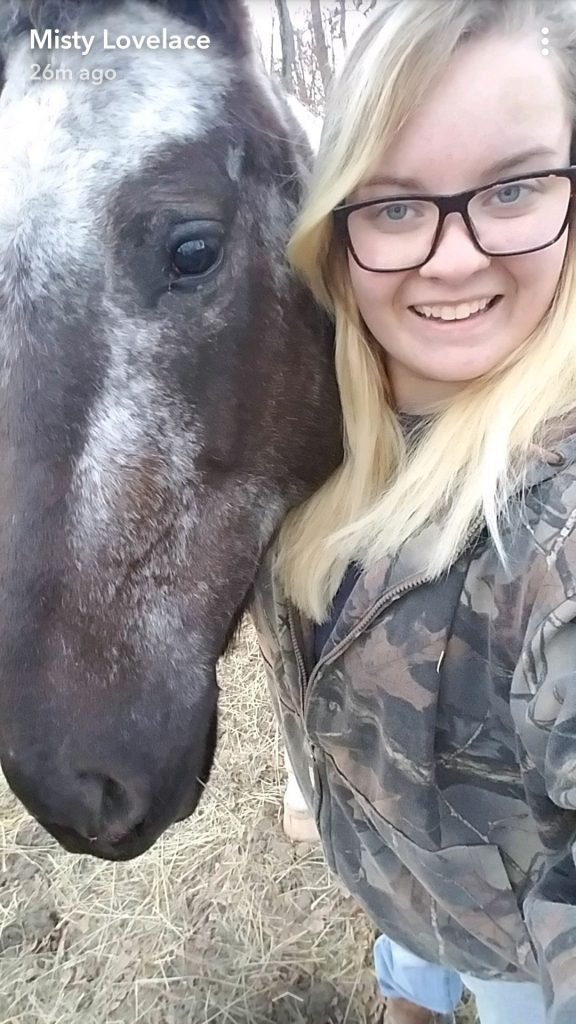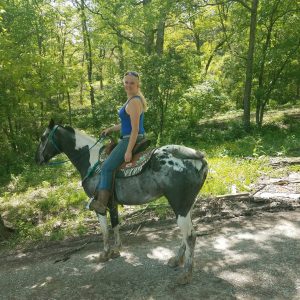Misty Lovelace: ‘I Can See Little Things’
 Told at age 12 she would be blind by 18 because of her Leber congenital amaurosis, Misty Lovelace of Kentucky participated in the gene therapy trials for LUXTURNA, to treat visual impairment caused by LCA-RPE65. At 18, the age when a doctor predicted Misty would be blind, she is ever so grateful for her sight.
Told at age 12 she would be blind by 18 because of her Leber congenital amaurosis, Misty Lovelace of Kentucky participated in the gene therapy trials for LUXTURNA, to treat visual impairment caused by LCA-RPE65. At 18, the age when a doctor predicted Misty would be blind, she is ever so grateful for her sight.
Turning 18 marks a milestone for most teenagers, but for Misty Lovelace of Kentucky, turning 18 meant celebrating her ability to see vibrant colors and sparkling stars.
It wasn’t supposed to be this way.
Misty, recalling a doctor’s pronouncement six years ago, said: “One day, I’m going to wake up and I’m going to be completely blind and it’s going to happen before I’m 18.
“It’s really hard for a 12-year-old to hear that,” she said. “It was really sad, really sad.”
Misty was born in October 1999 and diagnosed at 3 months old with “some kind of blindness.”
“In 2000, genetically, things weren’t existing then.”
To understand Misty’s level of vision then, she says to imagine wearing very dark sunglasses and looking through a PVC pipe. With no peripheral vision, she had to move her head, rather than just her eyes, to see up and down.
It was 11 years after her first diagnosis that doctors determined she had Leber congenital amaurosis (LCA), a rare inherited retinal disease (IRD).
“They didn’t tell me much of anything,” she said. “They just label you and you just go on. It’s trial and error. You never know what the right problem is until you find it.”
Diagnosis: LCA-RPE65
Dr. Robert A. Sisk of Cincinnati Children’s Hospital Medical Center did find the right problem and he sent a sample of Misty’s blood off to Children’s Hospital of Philadelphia, where she was genetically diagnosed with LCA-RPE65.
Back then, Misty felt different about the idea of genetic testing. “It wasn’t tremendously important for me to get it. It’s an option we can do.”
Now, “Clearly, I would definitely recommend it and I would recommend it at a young age.”
Misty was 12 when she joined Dr. Sisk’s research project for gene-therapy treatment for LCA-RPE65.
“They sat me down and said the surgery could make it the same, make it better or make it worse. Facing a choice between waking up blind before 18 or the surgery’s going to do it, you gotta take a risk.”
As a preteen living with her grandparents, Misty consented to genetic therapy surgery as part of clinical trials for the recently approved drug called LUXTURNA™.
In December 2017, the Food and Drug Administration approved LUXTURNA™, developed by Spark Therapeutics , as a breakthrough genetic treatment in which a human-engineered virus containing copies of a normal gene is injected under the retina.
Misty underwent the revolutionary treatment in 2013 when she was 13, and she experienced greatly improved vision in 24 hours.
“It’s amazing; I never thought that detail could be detail,” she said. “I can see hairlines, I can see little things that are so, just so nice. I see colors and bright neon colors.”
And now, at 18, the age when a doctor predicted Misty would be blind, she is ever so grateful for her sight.
A passion for horses
Before getting into the clinical trial and having surgery, Misty began riding horses.
 And that was a whinny and a snort I heard in the background while we talked. And she did sound like she was on top of the world. And, indeed, she was, riding atop Sassy, her paint appaloosa in a windy Kentucky field.
And that was a whinny and a snort I heard in the background while we talked. And she did sound like she was on top of the world. And, indeed, she was, riding atop Sassy, her paint appaloosa in a windy Kentucky field.
“I train horses, I give lessons. I love to give horses their second shot,” she said. “People see a horse one time and don’t put a lot of effort into it. They break metal fences and knock down poles, trample people.
“I like it because the only way you can learn and expand your knowledge of horses is to find the troublemakers. That’s what my horse is, definitely the troublemaker.”
Misty said she would have continued her interest in horses even if she didn’t have the LUXTURNA treatment.
“It just helped me. It helped people trust me because not everyone is going to let a visually impaired or blind person ride a stubborn, crazy horse.”
She gets along with horses well because her visual impairment gave rise to what she calls a sixth sense. She said she often can feel people’s presence before it is obvious, and horses possess similar instincts.
“Horses are very, very, very amazing creatures. They can sense your emotions. They can read you like a book. They are very smart, intelligent animals.”
Misty’s also learned about human nature along the way and the desire to fit in.
Real stars, for the first time
She remembered when she was in fifth grade and someone brought in a big drum, which turned out to be a celestial telescope. Everyone in the class, except her, could see the stars.
“They drew them on a piece of paper. Kids asked if I could see them and I said, ‘Yeah,’ even though I didn’t really see. Kids are mean, they always have been. As soon as I went to middle school, I started to be put down. I was called Helen Keller, kids were absolutely awful.”
She left school in the middle of seventh grade to have the surgery and returned at the beginning of eighth grade.
“When I came back, everybody thought I was so different. They didn’t know what happened. It was a complete turnaround. Everybody wanted to be my friend.”
She now is homeschooled, calling it the best thing in the world.
“I would recommend it to anyone visually impaired. I get to wake up early, do my schooling and I ride my horse the rest of the day.”
She is particularly happy about one of the moments in her journey.
Before Misty’s mom passed away, shortly after her eye surgery, mother and daughter shared a special time.
“She got to see the moment of me first-ever seeing the stars,” Misty recalled. “It was funny, too, me and my sisters, we were all swimming in our Walmart swimming pool, being careful of the chlorine. I looked up at the sky and just started screaming, and I had no idea what they were and why they were there and why did they blink. (My mom’s) freaking out and I’m freaking out.”
Running out from the house, Misty’s mom thought chlorine had gotten in her daughter’s eyes, while Misty initially felt angry, a little betrayed, that the stars in the sky didn’t look at all like the five-pointed ones she’d seen in drawings.
Then she realized the stars she saw were the real deal.
“Now I love looking up in the sky and seeing the stars. I love thinking that at one point in time, they were imaginary for me.”
